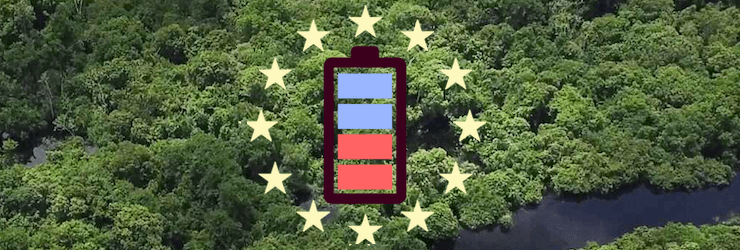Andreas Genest von ifu Hamburg, Member of iPoint Group, nahm vom 23. bis 25. Januar am BatterieForum Deutschland 2019 in Berlin teil. Die dreitägige Veranstaltung versammelte rund 350 Mitglieder aus Politik, Wissenschaft und Wirtschaft.
Die Vorträge behandelten ein breites Spektrum von Themen im Zusammenhang mit Lithium-Ionen-Batterien (LIB), die von der Batterieherstellung und der Rohstoffbeschaffung über die neuesten wissenschaftlichen Erkenntnisse bis hin zum Einsatz von LIB in der Logistik und E-Mobilität reichen. Das vollständige Programm finden Sie hier: https://www.batterieforum-deutschland.de/kongress/programm/
Strategische Fragen in der globalen LIB-Industrie
Der erste Tag konzentrierte sich vor allem auf strategische Fragen zum weltweiten Vertrieb von Lithium-Ionen-Batterien. Während für die Branche in den nächsten Jahren mit exponentiellen Wachstumsraten gerechnet wird, besteht auch eine gewisse Unsicherheit darüber, ob die prognostizierte Nachfrage bei den derzeitigen weltweiten Produktionskapazitäten gedeckt werden kann.
Auf der politischen Seite wurde die Befürchtung geäußert, dass Deutschland und Europa möglicherweise nicht in der Lage sein könnten, mit der globalen LIB-Produktion Schritt zu halten. Mitteleuropa zeichnet sich zwar sowohl in der Grundlagenforschung als auch in der Materialforschung im Zusammenhang mit Lithium-Ionen-Batterien aus, verfügt aber derzeit nicht über die Kapazität für eine groß angelegte Batterieproduktion.
Die USA und China hingegen investieren Milliarden von Dollar in große Produktionsanlagen. Die europäische Industrie ist angesichts der derzeitigen Produktionsstrukturen und der Renditeerwartungen ihrer Aktionäre noch nicht bereit für solche Investitionen.
Brancheninsidern zufolge gibt es noch keinen Beweis dafür, dass Investitionen in große Batterieproduktionsanlagen jemals finanziell solide sein werden – ein Gefühl, das die politische Zurückhaltung bei der Unterstützung der großen LIB-Produktion in Europa verstärkt.
Betrachtung des Umwelteinflusses der Batterieproduktion
Am zweiten Tag der Konferenz wurden Forschungs- und Entwicklungsfragen wie die Erforschung der Batterietechnik, das LIB-Recycling und die CO2-Bilanz sowie die Entwicklung von Hochspannungsbatterien für den Einsatz in der Automobilindustrie behandelt.
Andreas Genest von ifu Hamburg hielt einen Vortrag über Life Cycle Assessment (LCA) für Lithium-Ionen-Batterien und ging dabei sowohl auf die Möglichkeiten als auch auf die Grenzen der Methode, der Daten und der LCA Software ein. Der Vortrag regte eine aktive Diskussion über den Einsatz von LCAs im Allgemeinen an, da verschiedene Studien scheinbar unterschiedliche Ergebnisse liefern und Fragen zu bestimmten Batteriematerialien und deren ökologischen Auswirkungen aufwerfen.
Zukunftsausblick auf produktionsrelevante Ressourcen
Am dritten Tag wurde auf die Verfügbarkeit der für die Produktion von Lithium-Ionen-Akkus benötigten Ressourcen eingegangen. Zu den diskutierten Themen gehörten die globale Ressourcenverfügbarkeit unter verschiedenen Marktszenarien sowie Angebots- und Nachfrageprognosen für Rohstoffe wie das seltene Metallkobalt, ein entscheidendes Element der Batterieproduktion.
Zusammenfassend lässt sich sagen, dass der Markt möglicherweise nicht in der Lage sein wird, die kurzfristige Nachfrage nach allen für die Batterieproduktion benötigten Rohstoffen zu befriedigen. Solche vorübergehenden Engpässe können zu erheblichen Preisschwankungen auf dem Markt führen, was erhebliche Herausforderungen für die langfristige Finanzplanung zur Folge hat. Derzeit scheint es keinen geologischen Ressourcenmangel zu geben, der die globale LIB-Produktion einschränken könnte.
Aus Lebenszyklussicht ist der Zugang zur Ressource Lithium jedoch mit Umweltrisiken und schwerwiegenden Bedrohungen für die Ökosysteme in den jeweiligen Regionen der Welt verbunden. Die größten Lithium-Ressourcen werden in Chile und Bolivien geschätzt. In Chile hat der Wasserbedarf für die Gewinnung bereits zu einer Absenkung des Grundwasserspiegels geführt, die die Existenzgrundlage der lokalen landwirtschaftlichen Gemeinschaften in der Region der Atacama-Wüste zerstört. Daher wird die verantwortungsvolle Beschaffung von Lithium auf globaler Ebene auch in Zukunft eine Herausforderung bleiben.




.png)

